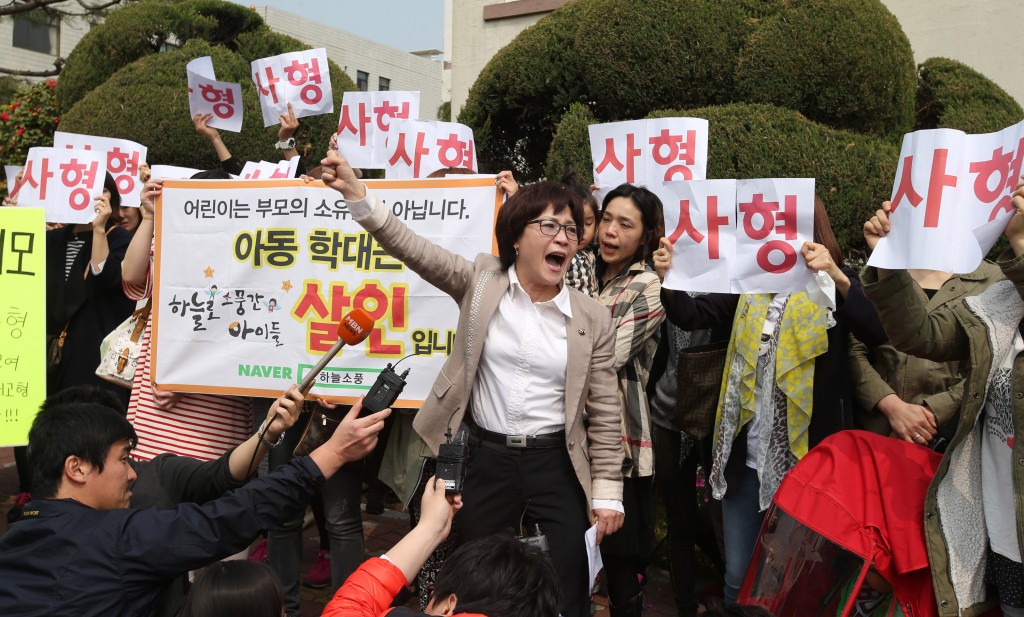- California Assembly OKs highest minimum wage in nation
- S. Korea unveils first graphic cigarette warnings
- US joins with South Korea, Japan in bid to deter North Korea
- LPGA golfer Chun In-gee finally back in action
- S. Korea won’t be top seed in final World Cup qualification round
- US men’s soccer misses 2nd straight Olympics
- US back on track in qualifying with 4-0 win over Guatemala
- High-intensity workout injuries spawn cottage industry
- CDC expands range of Zika mosquitoes into parts of Northeast
- Who knew? ‘The Walking Dead’ is helping families connect
Child abuse rulings met with outrage in Korea

The Daegu District Court sentenced a 35-year-old woman identified as Lim, left, to 10 years behind bars for repeatedly beating her eight-year-old girl for a year before her death. The girl’s biological father, right, received 3 years. (Yonhap)
By Kim Da-ye, Kang Hyun-kyung
Public outrage was triggered Friday by lighter-than-expected jail terms given to two women who were convicted of beating their stepdaughters to death.
The Daegu District Court sentenced a 35-year-old woman identified as Lim to 10 years behind bars for repeatedly beating her eight-year-old girl for a year before her death.
In the Ulsan District Court, a 41-year-old stepmother got a 15-year prison term.
Both cases attracted national attention for extreme brutality used against children, triggering the government to start taking steps against child abuse.
The courts in Daegu and Ulsan were packed with spectators.
After the sentencing, some of them protested and claimed that justice had not been delivered.
Netizens joined in.
“A mere 10 years for murdering a child,” one netizen proclaimed.
Another lamented that the convicted stepmother in Daegu tried to frame the 10-year-old elder sister of the deceased for the death.
“The court treated the precious life of a child as if it were that of a fly,” the posting said.
Protestors claimed that the court should have more positively accepted prosecutors’ demands.
The Daegu case took place in August.
Lim and the biological father of the child left her at home for two days until she died of peritonitis from ruptured organs from the beating.
The father was given a three-year prison term for violating the Children’s Welfare Law.
A three-judge panel at the Daegu court concluded that the parents tried to force the elder sister to take the blame. The sister changed her testimony in a closed hearing.
The Korean Women Lawyers’ Association, whose members helped her in the trial, criticized the punishment meted out to Lim as being too light.
Chairwoman Lee Myung-sook demanded the prosecution appeal the decision.
Daegu prosecutors had said Thursday that they would pursue the case at the high court, but withdrew the plan Friday.
The court defended its decision, saying, “The sentence is harsher than a recent ruling on another child abuse case that handed out eight years in prison.”
The stepmom in Ulsan faced prosecutors’ request for the death penalty on murder charges.
She beat the stepdaughter, whose autopsy showed she had 16 broken ribs with one piercing one of her lungs.
The court said, “We couldn’t conclude that the accused intended to murder her.”
Meanwhile, Justice Minister Hwang Kyo-ahn vowed Friday that he would take all possible measures to stop child abuse.
“We will try and impose harsher punishment on people responsible for abusing children and also introduce protective measures to help the victims,” Hwang said during a meeting with senior ruling Saenuri Party officials.
Hwang said that his ministry will work closely together with the Ministry of Health and Welfare and the Ministry of Security and Public Administration.
“It’s deplorable that the nation has seen two brutal child abuse cases recently. These incidents prompted me to think that policies dealing with child abuse might have some loopholes,” Hwang said.
Saenuri Party lawmakers voiced concern about the cases.
“We are embarrassed at seeing such brutal cases as our party took the initiative in passing the bill banning child abuse and calling for harsh punishment for those responsible for abusing children,” said chief policymaker Yoo Il-ho.
Cho Yoon-sun, minister of gender equality and family said that her ministry will take the lead in an initiative to share information with other relevant ministries through which they can work closely together for swift countermeasures.

















